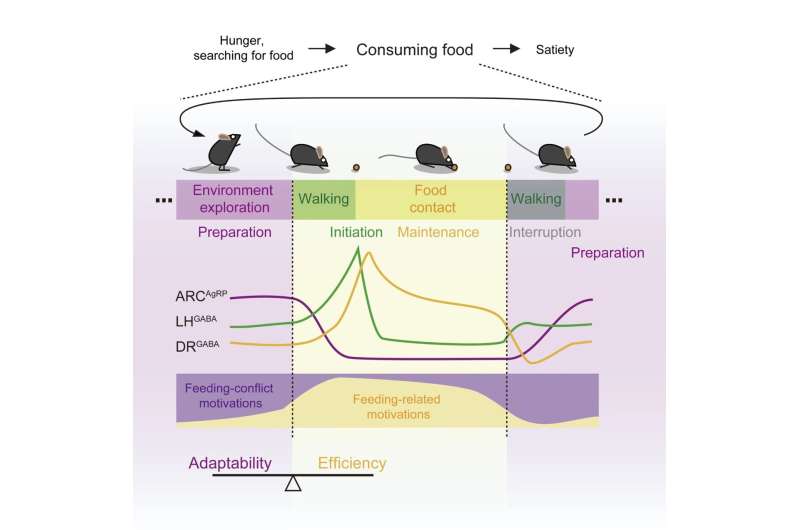This article has been reviewed according to Science X's editorial process and policies. Editors have highlighted the following attributes while ensuring the content's credibility:
fact-checked
peer-reviewed publication
trusted source
proofread
Scientists elucidate fine neural orchestration of feeding processes for the first time

A research team led by Dr. Wang Liping from the Shenzhen Institute of Advanced Technology (SIAT), Chinese Academy of Sciences, has conducted a detailed study of spontaneous behavior during the food consumption process in mice using a deep learning assisted behavior tracking system.
The study was published in Neuron.
The researchers described the fragmented feeding behavior characteristics in fasted mice of alternating between feeding and non-feeding related behaviors, and revealed that multiple neural populations sequentially regulated the preparation, initiation, and maintenance of a feeding segment.
They used a deep learning algorithm to identify the actions of mice in a single frame of video. A total of 14 characteristic movements were identified, and these movements were classified into eight meaningful behaviors using clustering algorithms.
These behaviors were then divided into three categories: feeding, walking, and environmental exploration. "The spontaneous behavior of mice during the food consumption process was described as an iteration of behaviors such as 'approaching food, contacting food, leaving food, and exploring the environment," said Dr. Wang.
Through analysis of calcium responses of different neural populations during spontaneous behavior, the researchers found that ARCAgRP neurons were activated when mice were fasted with food in the environment, but mice were exploring the environment rather than eating.
In the process of approaching food and eating, these neurons were inhibited. LHGABA neurons were activated when the mice initiated feeding behavior, and the duration of activation was only weakly correlated with the duration of feeding behavior. DRGABA neurons were continuously activated during feeding, and the duration of activation was strongly positively correlated with the duration of feeding behavior. DRGABA neurons were inhibited when the mice left the food to explore the environment.
The researchers used optogenetic methods to further investigate the function of ARCAgRP, LHGABA, and DRGABA neurons in the fragmented feeding behavior of mice.
Inhibiting ARCAgRP neurons led to more environmental exploration and reduced feeding in fasted mice, while activating these neurons increased feeding and decreased environmental exploration in the presence of food but had no effect on environmental exploration in the presence of plastic pellet.
Activating LHGABA neurons caused mice to exhibit intense biting behavior, while inhibiting these neurons caused fasted mice to be unable to bite food. Activating DRGABA neurons significantly prolonged feeding behavior in mice, while inhibiting these neurons significantly shortened feeding behavior.
Therefore, the researchers speculated that the function of ARCAgRP neurons is to restrict non-feeding behavior during hunger, thereby allowing feeding-related motivations to take over and initiate feeding behavior. They also concluded that LHGABA neurons mediate the initiation of feeding behavior and DRGABA neurons are involved in regulating the maintenance of feeding behavior.
Similar to mice, humans also exhibit fragmented feeding behavior and do not continuously focus on food during the feeding process but constantly pay attention to the surrounding environment. Children play while eating, while adults usually engage in social activities while eating.
"This study deepens our understanding of the feeding process and the neural regulation mechanism, and provides new ideas for the investigation of feeding-related disorders," said Dr. Wang.
More information: Liping Wang, An iterative neural processing sequence orchestrates feeding, Neuron (2023). DOI: 10.1016/j.neuron.2023.02.025. www.cell.com/neuron/fulltext/S0896-6273(23)00129-0



















